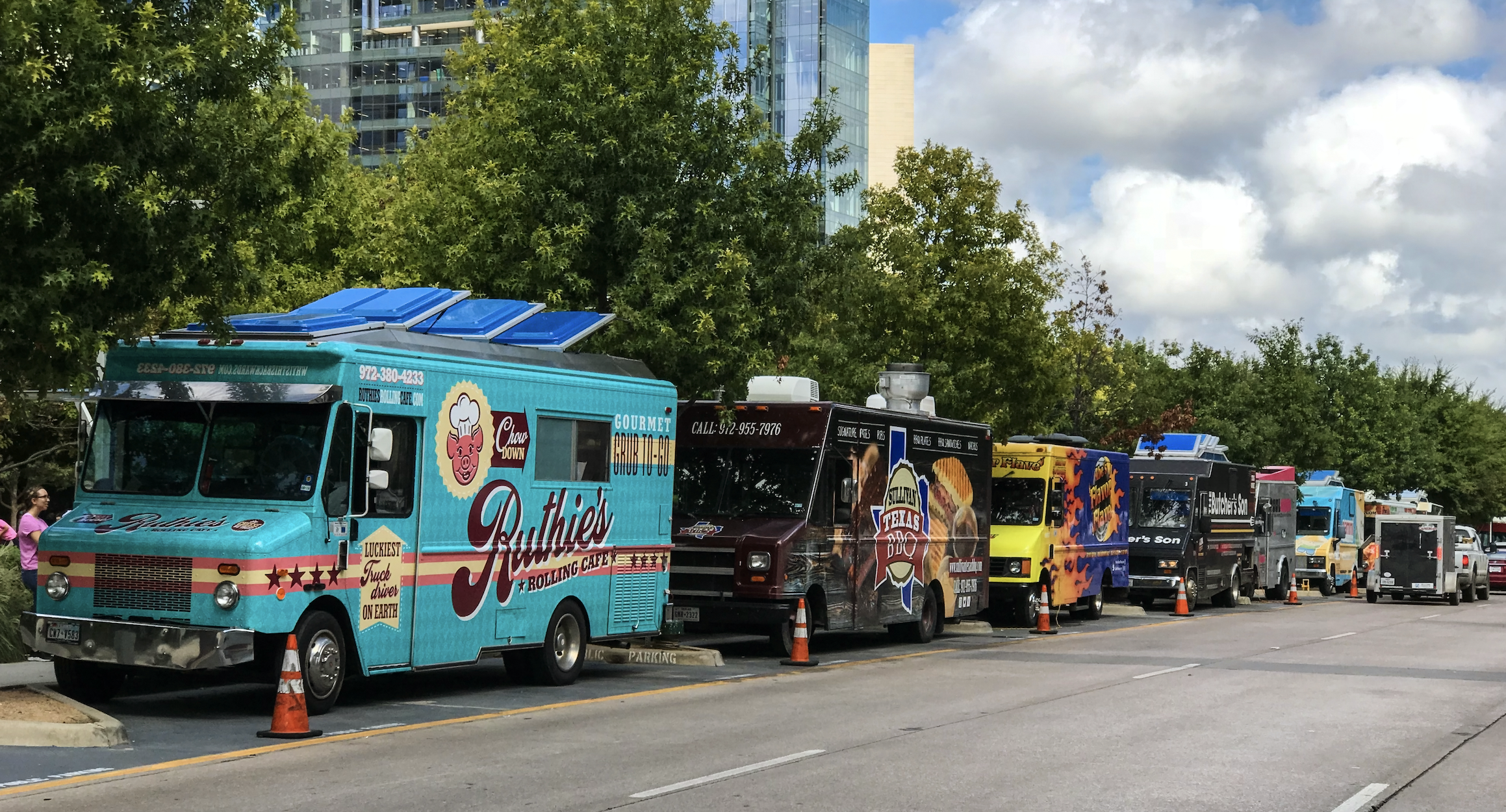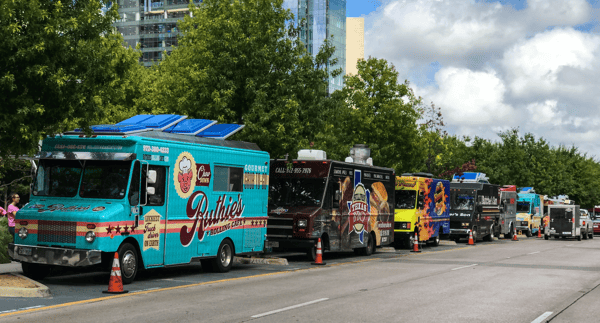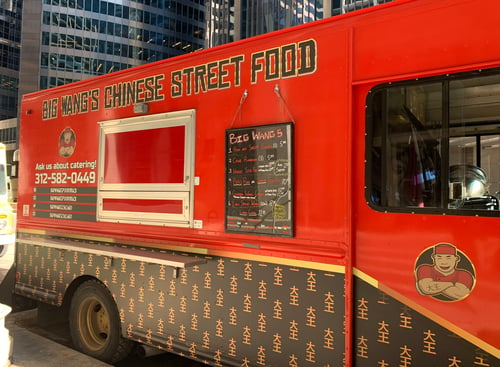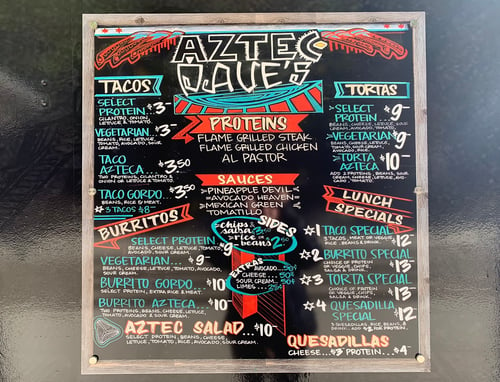
Looking to turn your passion for food into a serious business? You might be thinking that starting a food truck is the best place to start. But is that necessarily the case?
Maybe. Depending on how much you spend on the truck, the food, and the marketing, owning a food truck could be cheaper than your traditional brick and mortar restaurant. But starting a food truck takes more than a passion for food; it takes business savvy as well. Your food truck is a business in the same way opening your own restaurant would be.
When we say this is a complete guide, we mean it! This article will outline everything you need to know about starting a food truck; from how to conduct competitor research to finding the best free software for designing your first logo.
|
If you want more information about a specific topic about food truck ownership, click the links below to jump ahead: |
A food truck is a mobile restaurant and though it’s called a food truck, it doesn’t have to be outfitted in a truck. Some food trucks are housed in vans or trailers. The key thing about a food truck is that it’s an all-in-one restaurant on wheels that allows the owner to cook, prepare, and sell food on the go.
A popular myth in food truck ownership is that owning a food truck is cheaper than traditional restaurant ownership.
The truth is that depending on how fancy you want your food truck to be, you could spend anywhere from $30,000 to $175,00 on the truck alone. That doesn’t take into account repairs, gas, supplies, applying for a business license, and more.
Much like any other small business, food truck ownership is expensive. It’s not something you can do halfway. If you’re serious about taking on the financial burden and time investment then owning a food truck can be a wonderful thing! You just have to be sure you know what you’re getting into.
Once your preliminary research is finished, you’re ready to move forward. Food truck ownership is a process that will likely take months to prepare. Don’t rush things. Take your time to ensure you get it right the first time.
Before you get your food truck off the ground, you should start with some market research. Market research is just a fancy way of saying know who your competition is. You might have a unique menu or food truck theme but at the end of the day, you are competing with every other food truck in your area.
If you’re planning on opening your truck in a big city, that could mean dozens of competitors who already have an established client base. You’re also competing against the brick and mortar restaurants in your city.

There are a few things to keep an eye on when conducting your initial research. Evaluate the space and see if there’s a niche you can fill. Sample the food at some of the popular food truck spots. Ask customers what they like about their favorite truck. This information is invaluable.
Due to the limited space available for ingredients, most food trucks will only serve one type of food and a limited menu. This makes choosing the cuisine your truck will sell very important. Focus on what you enjoy cooking and pinpoint a few dishes that you think can wow your customers.
Here are some popular food truck cuisines that you can play around with:
| Fusion food | Pizza |
| Burgers | Dessert |
| Gourmet sandwiches | Mediterranean |
| Health food | Donuts |
| Regional favorites | Tacos |
These are just a few of the options your food truck has! When choosing your cuisine you might want to consider what food your competitors serve. If there are already a number of taco trucks in your area, it might benefit you to try something different.
When deciding on a business name, you want to create something that’s catchy, fun, and easy to remember. There are a thousand different ways you can go when naming your food truck. Some people like the name it after themselves, while others like using puns.
Big Wang’s is a perfect example of a fun food truck name. It communicates exactly the type of cuisine you’re getting with a cheeky play on words.

No matter what you decide to name your truck, remember that the name sets the tone for your business and brand. Be thoughtful about what you call yourself. Remember, this is the name people will use when recommending your business to their friends!
|
Here’s a list of ideas you can use to brainstorm your food truck name:
|
There’s also a legal aspect to naming your truck. You’ll want to ensure that whatever name you chose isn’t already being used by another business. You could risk violating a trademark if there’s another restaurant or food truck with the same name. Always check that the name for your truck isn’t taken with the United States Patent and Trademark Office.
Once you have your food truck name you can begin building your brand. A brand is much more than the food you sell or even the design of your truck, it’s everything you incorporate into your business.
The packaging of your food, your social media presence, even the way you respond to online reviews are part of your brand. What kind of image do you want to put out into the world? Are you a serious restaurateur who creates fine dining? Or are you a casual burger joint that enjoys the classics? These are things to consider when creating your brand.
|
What do you need for your brand?
|
Once you have a clear vision for your brand you can move onto bigger projects like building your website and creating social media accounts. With your vision already in mind, designing these extensions of your brand will be much easier!
You might think designing your menu is one of the first things on the to-do list for starting a food truck but you’d be wrong! Getting your ducks in a row with your branding and business name are important steps to take first. Your menu should reflect your brand in the same way your website does!
The best food truck menus focus on creating a couple items really well. Remember, you don’t have the same amount of space as a regular restaurant kitchen. You’ll need to get creative with what you can create in the small space you have.
Take this example from a local Chicago food truck. The design of this menu works both with the visual design and the food itself. Aztec Dave’s is focusing in on doing a few things really well and this chalkboard design draws the eye in, while making it easy to find what you’re looking for!

If the illustrative design isn’t your cup of tea, you could always focus your menu on showcasing the food you make. The right food photography can help customers see exactly what they’re getting before they order it.
Let’s be honest, designing your brand and naming your business is the fun part of food truck ownership. But it’s still a business, which means you’ll need to create a business plan.
Your business plan is your roadmap to success. It shows where you want your business to go and details how you plan on getting there. And if you’re looking to secure financing from investors or partners, you’ll need a business plan to show them you’re serious.
|
Here’s how to write a business plan:
|
This is the boring but necessary part of food truck ownership. While it’s not the most glamorous part of owning your own business, it will save you a lot of time and effort in the long run. Your business plan doesn’t have to be a certain length, so long as it includes the eight things we mentioned above you’ll be just fine.
A food truck is a business and like any restaurant you’ll need your licenses and registrations in order before you start selling food. In many states you’ll be required to get a business license. Check with your states individual requirements to ensure you have everything you need.
|
Here are a few things you might need before operating a food truck:
|
In order to offset the popularity in food trucks, some cities have recently passed laws requiring special licensing, parking permits, and more. Don’t assume you have everything you need because you’re compliant with the state. Always double check with your city as well!
Another tip? Make sure you don't need a special license to park and store your truck. There are likely parking limitations on city streets and you might need special storage for the times you're not selling your food.
| Tip: Learn the step-by-step process for registering your business |
There’s a pretty good chance you’re going to need help financing your food truck. There are a couple ways to do this. You could rely on the help of an angel investor or even crowdfund the expenses on a website like GoFundMe or IndieGoGo. Another option is getting a small business loan from the bank for your food truck.
|
Whichever option you choose, there are a few steps you should take: 1. Calculate what you can afford 2. Decide on the best funding option 3. Prepare and apply |
People want to feel like their money matters. If you can prove that your business has the chance for success then people are more likely to donate to you or give you a loan. Good thing you put together that business plan, huh?
We’ve talked about how you’re going to pay for the truck, but how are your customers going to pay you? Some food trucks only accept cash but with how quickly the world is moving toward digital, it makes sense to accept credit cards.
If you’re planning on accepting credit or debit cards then you’ll need to invest in a restaurant point of sale software. These complex software solutions actually do more than accept credit card payments, they also allow orders to be tracked and communicated digitally, track inventory shortages, and edit orders after they’ve been placed.
POS software can be used on mobile devices or tablets which makes them perfect for the tight quarters of your food truck.
 |
You’ve purchased the truck, designed the menu, and filed all the required paperwork. It’s time to get this show on the road! Just like any business, your food truck will need a marketing strategy to get the word out.
|
Here are some ways you can promote your food truck:
|
A combination of all of these strategies will increase your chances of reaching new customers. These strategies can also work once you become a more established food truck. There will always be people who haven’t tried your food before. Don’t underestimate the power of advertising at any size!
When starting a new business, there will always be pros and cons. None of these should completely derail your dreams of food truck success. As long as you plan ahead and you’re thoughtful about starting your business, you can avoid some common mistakes.
There are plenty of advantages to owning a food truck. Here are a few reasons food trucks are a good alternative to restaurant ownership:
Cost: While they still cost a decent amount of start-up capital, food truck ownership is generally cheaper than owning a restaurant.
Profits: The right combination of lower overhead expenses and long-term success can lead to the owner of a food truck seeing higher profits in a shorter amount of time.
Mobility: Mobility means that you can travel with your customers and follow them where business is good. You’re not stuck in a single location, meaning there’s more opportunity for growth!
Expansion: If your food truck does see booming success, there’s also the option to expand. This can mean buying a second truck or even saving profits to open a storefront for your restaurant.
Food trucks are not a surefire path to success. There are plenty of disadvantages to owning a food truck that you’ll need to be aware of before you begin.
Competition: The food truck market has exploded in the last decade. You’ll need to be ready to compete with other trucks on both concept and food.
Pricing: For the customer, the appeal of a food truck is quality food at cheap prices. The ability to balance your menu prices with your operating costs is crucial for the long-term success of your truck.
Hours: Early mornings for prep work and finding the best location, hours serving food during the lunch rush, and a couple more hours cleaning and breaking everything down. Be ready to work 10-12 hour days at a time both weekdays and weekends.
Weather: Do you live in a place where it snows? Will heavy rain deter your customers? The elements can have a huge impact on your food truck and might make it difficult to hit sales goals due to unpleasant weather.
Don’t let the logistics of opening a food truck scare you off. If you have a passion for food and a willingness to learn the business side of things, there’s little reason you shouldn’t see success in your next venture. Now go forth and cook!
Interested in learning more? Check out these small business tips from people like you who have lived it.
Lauren Pope is a former content marketer at G2. You can find her work featured on CNBC, Yahoo! Finance, the G2 Learning Hub, and other sites. In her free time, Lauren enjoys watching true crime shows and singing karaoke. (she/her/hers)
Registration. What a headache.
 by Mary Clare Novak
by Mary Clare Novak
The cleaning business is a lucrative one.
 by Deirdre O'Donoghue
by Deirdre O'Donoghue
You would think there are no shortcuts to entrepreneurship, but there are.
.png) by Kevin Indig
by Kevin Indig
Registration. What a headache.
 by Mary Clare Novak
by Mary Clare Novak
The cleaning business is a lucrative one.
 by Deirdre O'Donoghue
by Deirdre O'Donoghue


